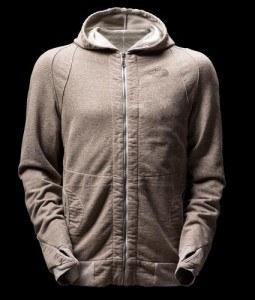
There are reams written about how far your food has traveled. And if you run in sustainability circles, you might have felt some guilt sneaking Chilean pears into your grocery cart this past winter. But have you ever thought about how far your clothing traveled to reach you? Some innovators in the space are trying to bring the locavore movement to your closet.
Local fashion is a whole different ball of wax, The North Face discovered when it set out to produce a hoodie made entirely within a 150-mile radius of its Bay Area headquarters. They were immediately stymied when they discovered that cotton mills had disappeared entirely from California. Despite this roadblock, the team carried on with the project and did their best to meet the challenge. They were able to get their Capay Valley Cotton milled and knitted in a North Carolina facility.
The project is one of many experiments in local engagement and market-building being undertaken by VF Corp. as a part of its sweeping sustainability program. You might not recognize the name VF Corp., but you certainly know its family of brands: The North Face, Lee, 7 For All Mankind, Reef, Timberland, Jansport and Wrangler, just to name a few.
Letitia Webster, global director of corporate sustainability for VF Corp., spoke about her role overseeing the sustainability programs for all these disparate organizations during this year's Sustainable Brands conference. VFC has managed to cut its carbon footprint by 5 percent despite the fact that revenue has grown 40 percent across the board.
Despite the clear environmental benefits of investing in sustainability, the higher-ups will always ask about the financials, "'Letitia, what have you done for me lately?'" Webster intones onstage, jokingly invoking her CFO.
Despite the challenges of tracking the financial return on sustainability projects, VFC brands are charging ahead with some of the most innovative capsule projects around, creating markets as they go.
The Local Hoodie project might have been small potatoes for the international retailer, but it made a massive difference in the work of local fiber craftspeople. Rebecca Burgess of Fibershed, a group dedicated to building regional textile communities, said that the economic development of the Bay Area fibershed in a typical year is around $47,000, a modest sum based mostly on farmers market sales. When The North Face got involved, the number grew to almost 50 times that amount.
Sally Fox of Fox Fibre provided the cotton, an heirloom ‘Buffalo’ brown. When asked how it felt to work with a big retailer, she said: “I was just happy. This was the first time my cotton had been used in a commercial product in 20 years.” This engagement in the local community reaps rewards far beyond those of a few carbon miles saved.
It worked for The North Face, too. While Adam Mott, director of sustainability for The North Face, admits that the Local Hoodie, "was certainly more expensive to make than a typical hoodie. But there was margin built in." The company didn't have to subsidize the production or pay for it out of foundation funds.
Another VF brand is taking local engagement in a whole different direction. Timberland, (yes, the work boot company), supported the Smallholder Farmers Alliance (SFA) with a $1 million grant over five years to work on reforestation, with the understanding that SFA would take the five years to figure out how to develop a program and make it self-sustaining. And develop one they did. Smallholder farmers (with 2 hectares of land or less), commit to plant and tend a network of trees on their land. In return, they receive training, seeds and tools to increase crop yields.
The project also works with farmers to build a market for the products made from the trees they tend. Moringa, in particular, has been successful due to the fact that the moringa tree is fast-growing (to an adult height of 13 feet in one year), and thrives with little water and in poor soil conditions. Demand for the superfood is growing in developed countries due to its high antioxidant content. The fact that these trees are more valuable in the ground than cut and turned into charcoal means that the trees "become a component of bio currency," said SFA co-founder, Hugh Locke.
When questioned about the value of the program for Timberland, Margaret Morey-Reuner, director of strategic partnerships and business development for the company, explained that it spent $1 million to make the business case for working with farmers. "Now that we know it's a success, we have support from VFC in terms of advocacy for the project."
Next up, Timberland hopes to engage the farmers in growing cotton, which could be used in the manufacture of Timberland's shoes in its Dominican Republic factory. By supporting the growth of a whole value chain in a single area, Timberland and VFC can help the region become self-supporting.
It's impressive to see such small, innovative projects completed under the umbrella of a multinational like VFC. With its breadth and buying power, the parent company has the potential to help pull hundreds of communities out of poverty. While these initiatives require a sustained effort, they don't require a handout.
Image credit: The North Face
Jen Boynton is the former Editor-in-Chief of TriplePundit. She has an MBA in Sustainable Management from the Presidio Graduate School and has helped organizations including SAP, PwC and Fair Trade USA with their sustainability communications messaging. She is based in San Diego, California. When she's not at work, she volunteers as a CASA (court appointed special advocate) for children in the foster care system. She enjoys losing fights with toddlers and eating toast scraps. She lives with her family in sunny San Diego.














